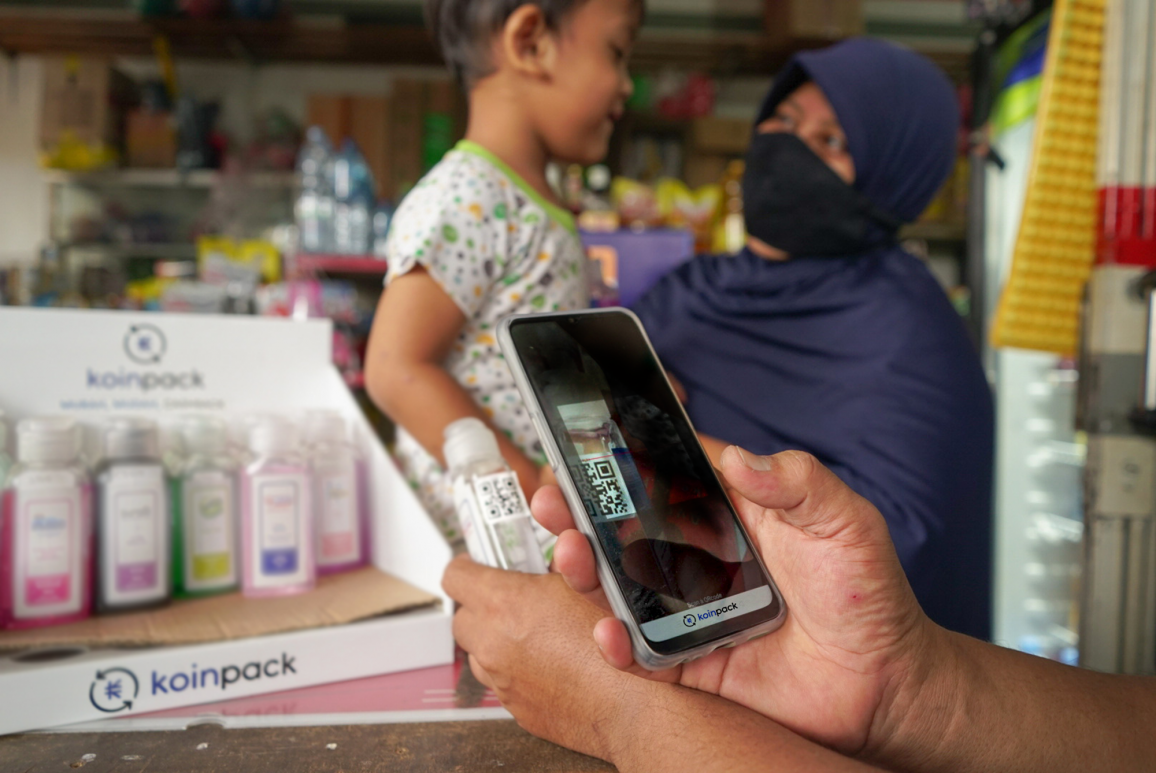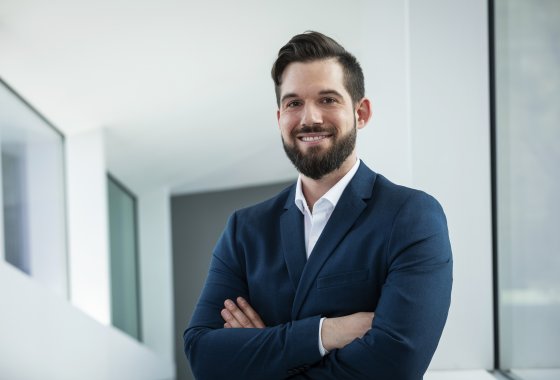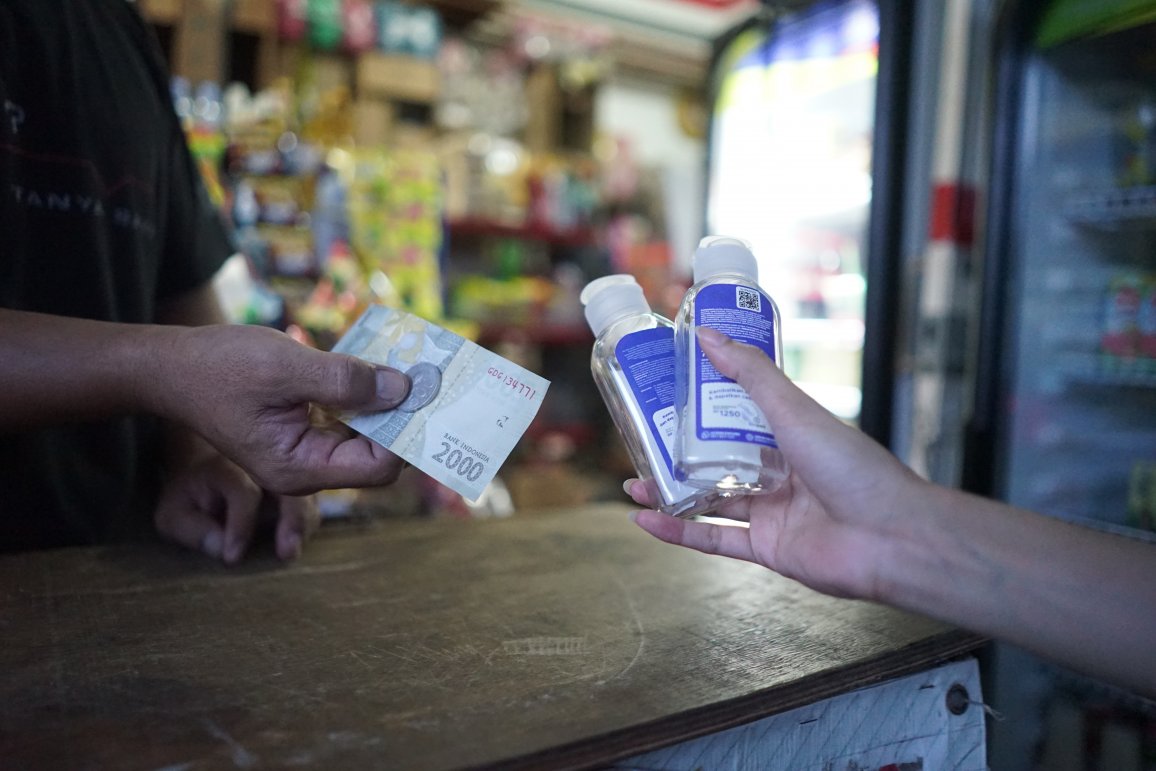„A good choice regarding the environment and the climate“
Koinpack is part of Enviu’s Zero Waste Living Lab programme and operates a deposit-based return system in Indonesia. The aim is to offer a reusable alternative to sachet packaging. We talked to Danilo Grieco, Project Manager for Innovation at ALPLA, about how the cooperation with Koinpack started and what exactly is happening there.

The Koinpack app allows points of sales to register bottle returns by scanning the QR code on the bottle. (Photo credits: Koinpack)
What exactly is Koinpack and how does the system work?
Koinpack is a deposit-based return system in Indonesia, one of the countries that contribute the most to marine plastic pollution. The aim is to offer a reusable alternative to sachet packaging, which falls into the category of small and flexible packaging and is dominant in many Asian consumer goods markets. Due to a sachet’s low weight, its large, specific surface and the low value of the materials at the end of its useful life, the sachet tends to escape the waste streams and end up in the environment. In the case of an island nation such as Indonesia, this means sachets ultimately often end up in the ocean.
Koinpack experimented with a number of different sales models and now sells its products via Warung stores – small shops that are very widespread in this region – and through peer-to-peer sellers. The products are additionally sold via what are known as waste banks. These are waste management and recycling hubs that work like a bank and also serve as community meeting places. With Koinpack, not only do the consumers make a good choice regarding the environment and climate – they also receive high-quality packaging with added functions.
Why did ALPLA decided to enter into a partnership with Koinpack and what is ALPLA’s role?
Our membership in the Ellen MacArthur Foundation brought us into contact with Enviu, a Dutch social venture builder that establishes for-profit businesses primarily in emerging countries with the aim of also addressing urgent social and/or environmental issues. Koinpack is part of Enviu’s Zero Waste Living Lab programme.
Starting with Indonesia, the objective is to avoid plastic packaging waste by using reusable and refillable packaging. ALPLA is supporting Koinpack first and foremost on the packaging side of things and wherever else we are able to provide support. For the pilot project, we are supplying Koinpack with 100 ml reusable PET bottles and PP flip-top caps.
The partnership with Koinpack is very interesting for us. Firstly, it allows us to tackle a problematic form of packaging that harms the image of plastics and therefore also our image. And secondly, it offers us insights into whether the Indonesian consumer is ready for a reusable system and can go without their familiar sachets. We are also able to learn about the opportunities and challenges regarding reuse in the market segment of household and personal care products – an area that we currently have no experience in.

"ALPLA is supporting Koinpack first and foremost on the packaging side of things and wherever else we are able to provide support. For the pilot project, we are supplying Koinpack with 100 ml reusable PET bottles and PP flip-top caps."
What role can the reuse market play for ALPLA? What potential do you see here?
While we have seen many great initiatives recently that aim to ‘avoid plastics at any cost’, the data suggests again and again that plastics generally perform better in terms of the impact on the climate than the alternatives made of glass or metal. However, the problem of littering does a lot more damage to the image of plastics than the positive effect of their good climate performance. The causes of the littering problem, such as improper plastics disposal, can be tackled by incentive-oriented reuse systems. I believe the greatest opportunities for reusable packaging lie in the following areas:
- For single-use packaging which is not easily recyclable due, for example, to its material composition and which has a low end-of-life value
- When waste management is highly inefficient or non-existent
- When the useful life of a packaging is very short, such as service packaging used for takeaway food and drinks
What have been the most interesting findings from your collaboration with Koinpack?
The most exciting moment was when we received the first feedback on the impact of the old, round bottles having been substituted with our proposed solution. This resulted in greater user acceptance, a better impact at the point of sale, a larger label surface that faces the consumer and better use of space during transportation. The new solution is easier to clean too. It was also exciting to use the app to test ourselves once the first version had been released, in order for us to understand the user experience.
What subsequent steps are planned?
The project is currently still in a pilot phase, but the fact that 430 billion sachets are used every year in South East Asia alone indicates its potential scope. Two fast moving consumer goods companies decided to get a Koinpack-partner in this piloting phase. The exciting next step for Koinpack will be scaling, which will go hand in hand with further development of the system.

Consumers return their bottles and receive a cashback. This allows for a fully circular system. (Photo credits: Koinpack)
Do you like our texts? Perhaps even so much that you want to use them in your own media? Then please get in touch with us beforehand!
